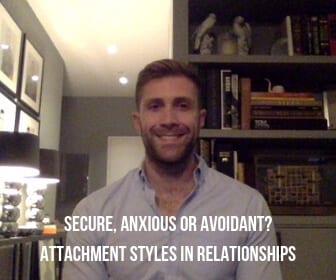Secure, Anxious or Avoidant? Attachment Styles in Relationships [Transcript]
Attachment styles were researched heavily by Bowlby and Ainsworth in the late 1960s and early 1970s. The idea behind attachment styles is that the quality of the care our caregivers give us when we are young effects how we later attach to people as adults. In other words, parental relationships can be models for relationships with friends or, more often, our significant others and partners in life. There are three main types of attachment styles. As I describe them, I will use examples from partnerships or primary relationships.
Secure Attachment
Securely attached people feel like their partner can give them what they need in a relationship. They feel safe in their partnership and are able to trust their partner. They feel like they are getting everything they need from their relationship. For example, if a securely attached person calls their partner and their partner does not answer, they will think “I am sure they are just busy and will call me back when they have a chance.”
Anxious Attachment
Anxiously attached people don’t really feel safe in their partnerships. They need a lot of reassurance from their partner that everything is okay in the relationship. They may feel like the relationship could end at any moment. They have a lot of anxiety around being left and so they seek out a lot of reassuring behaviors from their partner. For example, if an anxiously attached person calls their partner and their partner does not answer, they may immediately think that something could be wrong, that the partner might be upset with them, may have met someone else, or that something is definitely going on. They may try calling again and again and the anxiety will only go down when they have reassurance and contact from their partner.
Avoidant Attachment
Avoidantly attached people are pretty much the opposite of anxiously attached people. They tend to think that they don’t need attachment as much as the others. They can feel overwhelmed by attachment and push people away. Although they want to be in relationships, it can feel like too much for them. They may say to their partners things like “I need time” or “you’re suffocating me” or may leave long lapses between contact, all of which can be very frustrating to someone who is trying to date the avoidantly attached person. An avoidantly attached person is more likely to not pick up the phone or try to call the partner and, if their partner tries calling them, they may not answer or take a long time to get back to them.
Read more: Modern Dating and the Risk of Getting Ghosted
No attachment style is set in stone. People can be securely attached and then, when they date someone who is avoidant and holds back, become more anxious because they want reassurance. Knowing about these attachment styles is helpful when dating or to understand relationships in general. A book that I recommend to my clients is Levine and Heller’s Attached: The New Science of Adult Attachment and How it Can Help You Find–And Keep–Love. This book takes the principles of attachment and applies them to modern dating. Understanding attachment is very helpful with the way we live today.
Read more: The Value of Relationship Conflict
- How Can Mental Health Apps Help with Wellness? - October 1, 2019
- How to Control the Universe with Your Mind - July 19, 2019
- Secure, Anxious or Avoidant? Attachment Styles in Relationships [Video] - January 25, 2019





5 comments
I love this video blog! It’s such a great roadmap to relationship problems and where they stem from. It makes our confusing reactions and behaviors more understandable.
This is a great video on an important topic. I know from myself and my work with clients how eye opening it can be to learn about attachment styles. Thanks for the video Ryan. I look forward to learning more at the upcoming webinar!
This is such a great video blog! It really helps to understand behavior. Once you understand your behavior you can make the necessary adjustments to be your best self! I’m excited about the upcoming webinar on attachment styles. Thanks Ryan!
Understanding attachment styles is a great starting point for making sense of the way we act in all kinds of relationships, as well as how others respond to us. I know how helpful it has been for me to look at relationships with attachment in mind. Thanks for making this video, Ryan!
This is a great video blog! It’s so helpful to be reminded about the importance of our attachment style regarding how we show up in our adult relationships.